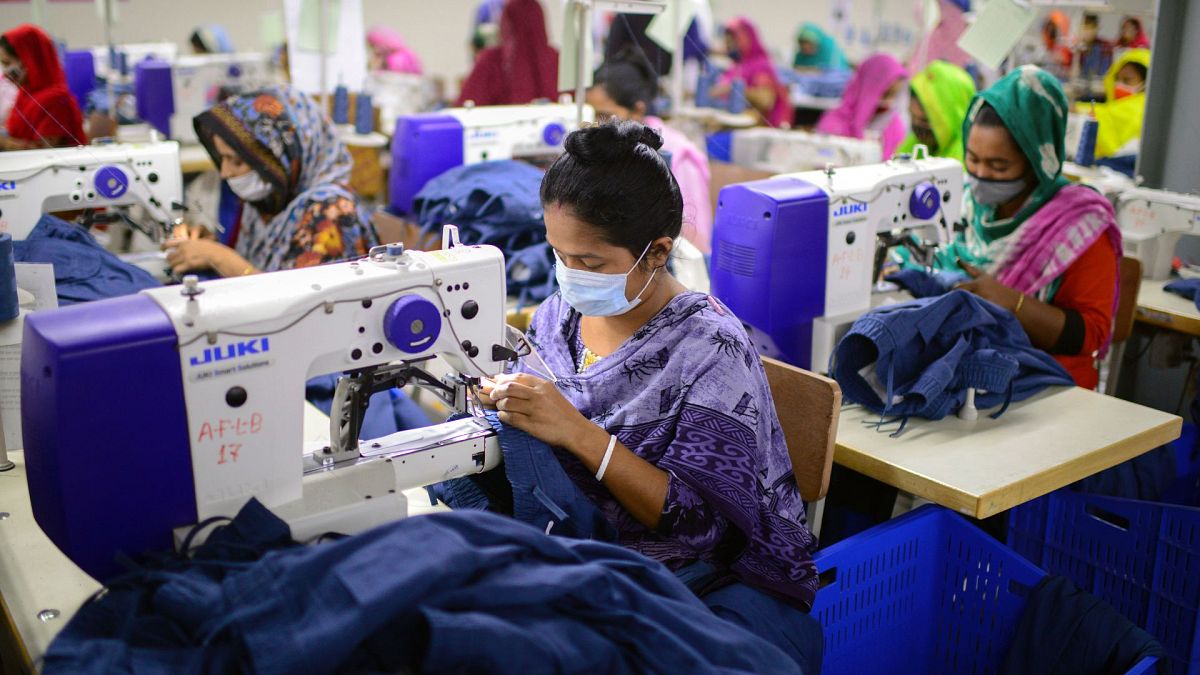France’s parliament has voted in favour of a crackdown on throwaway fashion.
Fast fashion adverts could soon be banned in France under a new proposal to crack down on the polluting industry.
France’s parliament voted unanimously in favour of the bill, which also seeks to impose penalties on low-cost clothing to cover its environmental impact, on Thursday.
The measures, tabled by MP Anne-Cécile Violland, will now pass to the Senate for a further vote.
“I am delighted with this major breakthrough,” Minister of Ecological Transition Christophe Béchu wrote on X on Thursday. “A big step has been taken to reduce the environmental footprint of the textile sector.”
‘Ultra fast fashion is an ecological disaster’
Béchu has been a vocal supporter of the bill, writing on X on Tuesday that “Ultra fast fashion is an ecological disaster: clothes are poorly made, widely purchased, rarely worn and quickly thrown away.”
He backs the proposed ban on advertising for fast fashion products, including via social media influencers, and the establishment of ecological penalties on clothing.
Béchu also voiced support for strengthened consumer information from fast fashion brands on the environmental impact of their clothing, and said they should encourage consumers to reuse items.
Shein targeted by French anti-fast fashion bill
Chinese-Singaporean fast fashion retailer Shein is specifically targeted in the proposal.
“Shein offers 900 times more products than a traditional French brand,” it reads, adding that the brand releases more than 7,200 new models of clothing per day, with a total of 470,000 different products available overall.
This allows the brand to attract a wide range of customers, achieve “vast economies of sale” and charge “ever lower prices”, it states.
This in turn forces European fashion brands to increase their output in order to compete.
Last month, Shein considered listing on the London Stock Exchange. In its application, the ultra-fast fashion brand, selling in more than 150 countries across the world, aimed for a valuation of around $90 billion, according to Bloomberg. This would be the biggest-ever initial public offering (IPO) on the LSE but could open its manufacturing practices up to scrutiny.
High turnover of cheap fashion items “influences consumer purchasing habits by creating purchasing impulses and the constant need for renewal”, the proposal warns, with negative environmental, social and economic consequences.
Fast fashion producers say that their business model reduces waste by maintaining a low level of unsold garments, whereas luxury brands have been criticised for their high levels of unsold stock.
The environmental impact of fast fashion
Each year, more than 100 billion items of clothing are sold worldwide, according to the French Environment and Energy Management Agency (ADEME).
In France, in the space of a decade, the number of clothes sold annually has increased by a billion, reaching 3.3 billion products or more than 48 per capita, eco-organisation Refashion notes.
Worldwide, the textile and clothing industry is responsible for around 10 per cent of greenhouse gas emissions, according to the United Nations Environment Program (UNEP) – more than the total from flying and maritime transport.
It also contributes to water pollution, 20 per cent of which is attributable to dyeing and processing textiles, along with the microplastics shed by synthetic materials when they are washed.
Cheap clothing is additionally associated with well-documented labour and human rights abuses.
What is being done to combat fast fashion pollution in Europe?
Various laws are gradually being introduced by the EU to curb the impact of polluting industries. The Climate and Resilience Law, for example, plans to make it mandatory to display environmental information on goods like clothing. It also targets misleading environmental labels, aims to reduce packaging, and promotes the repair and reuse of goods.
The EU Circular Economy Package furthers this goal by introducing a bonus to
repair products, promote the circular and local economy, and encourage eco-design.
However, these measures are not adequate in addressing the environmental threat of fast fashion, the French bill argues, adding that there must be a return to sustainable production volumes.
What would change under the French fast fashion bill?
The bill proposes strengthening consumer information and awareness on the environmental impact of fast fashion. It also seeks to encourage the reuse and repair of clothing to combat throwaway culture.
Placing greater responsibility on producers, it proposes fines based on the environmental impact and carbon output of goods, similar to those already imposed in the automotive industry.
Taking things like sustainability and recyclability into account, it would be enforced on a sliding scale and could reach up to €10 per item sold or 50 per cent of the purchase price by 2030, Violland told Radio France.
As well as promoting fair competition for companies that operate more sustainably, the fines would be used to fund waste management, bonuses for repairs, and public awareness campaigns.
Finally, the bill would prohibit advertising for fast fashion brands and products, similarly to how fossil fuel advertising was banned under the Climate and Resilience Law.
The bill has gained support from industry voices, including French menswear designer and head of the Fédération Nationale de l’Habillement (France’s National Clothing Federation) Pierre Talamon, who says brands that engage in “commercial marketing and overproduction techniques that push you to buy clothes to wear them seven to eight times and then throw them in the trash” should be penalised.
These players “do not create jobs but destroy them,” he adds.
It is hoped the bill could pave the way for future action, such as an EU-wide ban on the export of used clothing.

